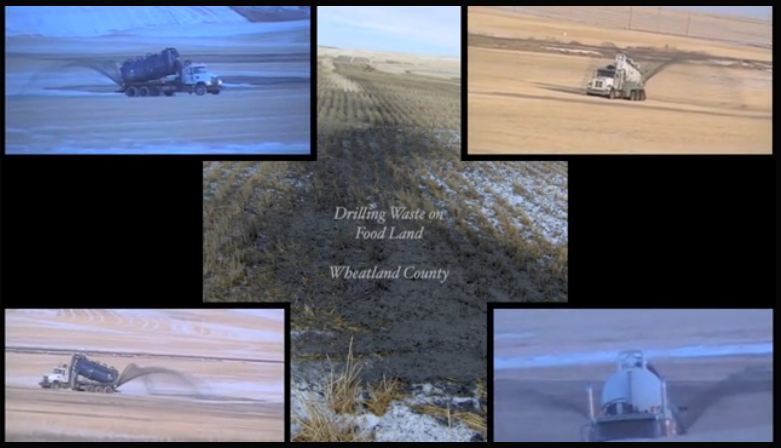AAMDC frac motion commotion by Sharon McLeay, March 15, 2013, Strathmore Times
Vicki Balance of the Canadian Association of Petroleum Producers addressed a letter to Wheatland Council expressing the Association’s policies of adhering to [voluntary] best business practises in natural resource development. “I have received a few phone calls on this issue,” said Reeve Glenn Koester. “I see it as the difference between best practises and regulation. In our proposal, we want regulation.” Municipal District passed the proposal and advanced it to AAMDC headquarters. Confirmation whether the proposal will be forwarded to the minister will be decided at the March AAMDC Convention.Council considered the proposal as a preventative method to make sure all companies adhere to best business practises and because they had no means to regulate practises at the County level. Councillor Don Vander Velde said his discussions with drillers indicate that no assurances can be given on what is happening underground at over 1500 feet. Councillor Ken Sauve commended resource companies who adhere to best practises and he agreed there were many companies that were not getting enough credit. However, he included that there is always room for improvements. Balance indicated in the letter that Alberta has some of the toughest standards in the world and that we are better protected here than in other areas.
EnCana waste dumping on Rosebud foodland in 2012, Screen Capture from FrackingCanada’s Short Film Home
Not all Albertans would agree that best practises take place at all times.There is an ongoing law suit initiated by Rosebud area resident Jessica Ernst, concerning fracing practises that she contends contaminated area well water. In an unexpected move by the Federal Department of Justice the Ernst case was delayed, and perhaps jeopardized, by the promotion of Honourable Barbara L. Veldhuis, the judge presiding over the case. She was appointed to the Court of Appeal of Alberta on February 8, just as she was about to make a ruling in the case that has attracted worldwide attention. Ernst said she does not know yet what will happen. Lawyers representing Ernst asked that that Judge Veldhuis, who heard the legal arguments, rule and the court accept her judgement, but they were told that it would not be an option. They were given two options that might happen; one was to start over, which will cost a lot of money, and time, especially if she is made to pay the defendants’ legal fees. The second option was for the new judge appointed to the case to read the legal briefs filed by the defendants as Encana didn’t file any briefs, and read the court hearing transcripts of Jan. 18, and rule. “I’m not discouraged, at least not yet, but I am reeling in shock,” said Ernst. “We’ve been forced into an impossible position. Either way, I am concerned it is bad for the case and very bad for Alberta’s groundwater. Industry, regulators and governments assure us that we have the courts to make everything right when we get frac’d and our water goes bad.” [Emphasis added]
[Refer also to:
Rural Alberta Councillors pass fracking resolution
Alberta county councillors scheduled to consider fracking-related resolution ]

